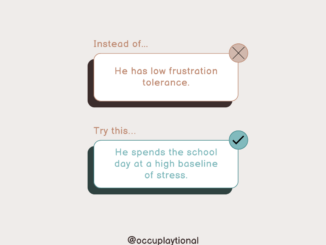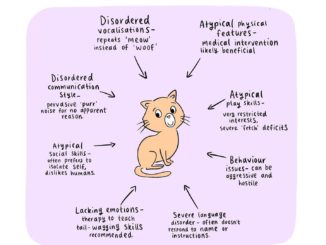I have a child on my caseload who is Autistic and a “gestalt language learner” — a descriptive term for children who learn to speak in phrases or scripts (as opposed to learning to speak one word at a time).
There’s many categories of gestalt language learning, and this isn’t meant to be a whole post about that. So to describe this boy, I’ll clarify that he speaks almost entirely in full, multi-word phrases that are “scripts”: they’re something he heard somewhere or hears regularly, and they stuck as the sole way to communicate that concept.
They might not be entirely literal, but they communicate a whole concept. For example, he says “we’re going on an adventure!” in the same intonation and cadence every time we leave the classroom. I.E., to mean, “we’re going [anywhere]!”
Well, we were coloring with markers and a marker lid got lost. He was trying to engage me in drawing and I was highly distracted looking for the marker lid. I said “Hang on, I’m trying to find the lid! I don’t want the marker to dry out.”
He made a token effort of looking for about 0.5 seconds and cheerfully chirped, “Uh oh! It’s all gone!” (Script #1.) “Well, it can’t be helped!” (Script #2.) “Well, it’s time to move on from that, buddy.” (Script #3.)
I hadn’t heard any of these scripts before, but the way in which they were delivered told me that he was parroting exact phrases that he was familiar and comfortable with, phrases to convey the concept “I’m not interested in that problem; get over it.” Quite effectively, I might add.
I was cracking up, because it was an objectively funny way to tell me he wasn’t particularly bothered about my missing marker lid. Which is totally fair. Adult problem. Kid is unconcerned with the future and very focused on the now. He was trying to show me something cool and I was focused on marker lids?? Bo-ring.
I was also wondering just how often somebody told him “can’t be helped” and “it’s time to move on” from problems that HE thought were important, but couldn’t convey to whoever was with him at the time, because THEY were exactly as dismissive of his concerns as he temporarily sounded to me. Often enough that these entire phrases stuck in his dictionary.
Phrases to convey the concept, “I’m not interested in that problem; get over it.”
A very functional concept to convey. I wish he wasn’t intimately familiar with being made to feel that way. I bet most children are.



